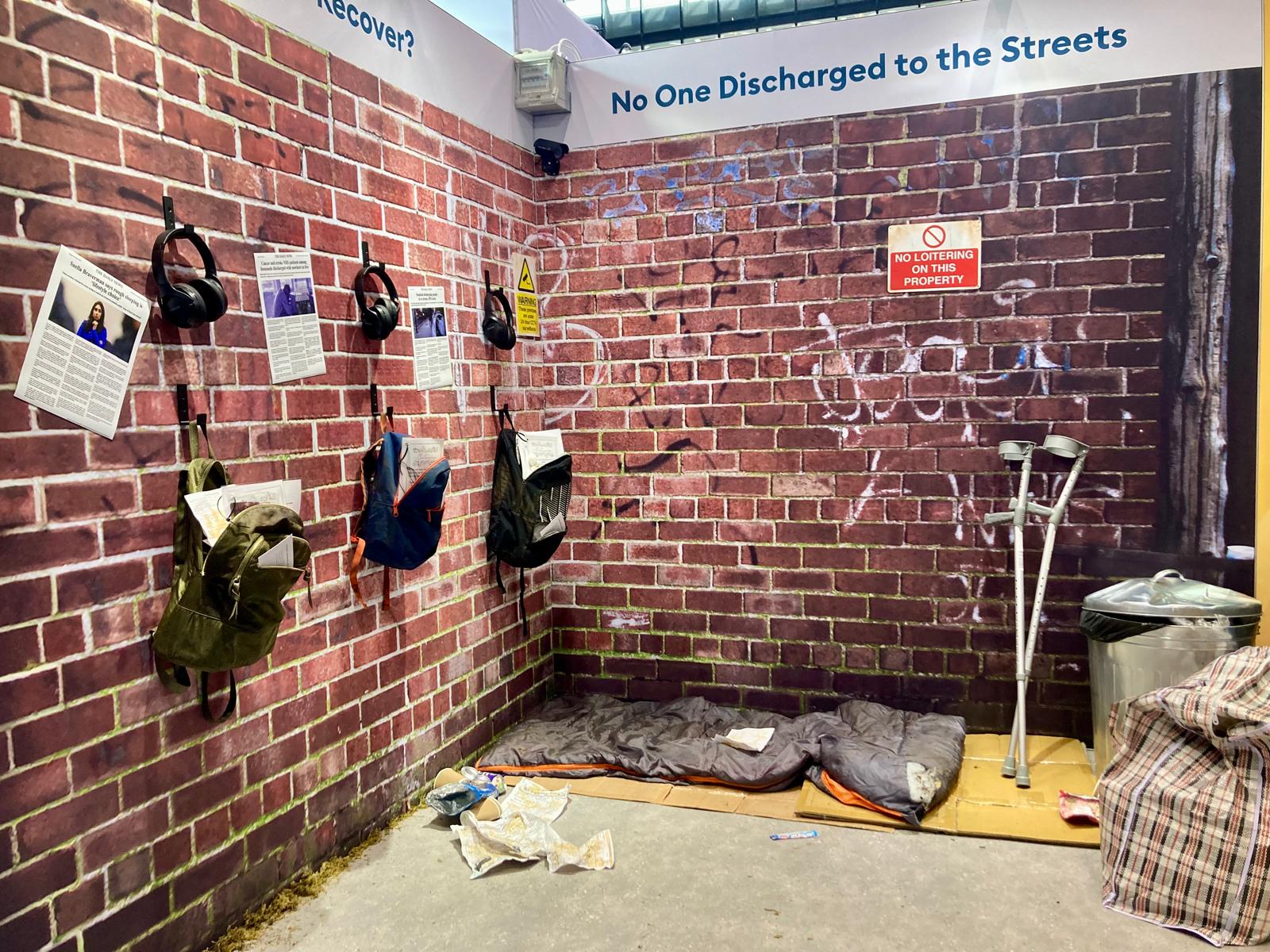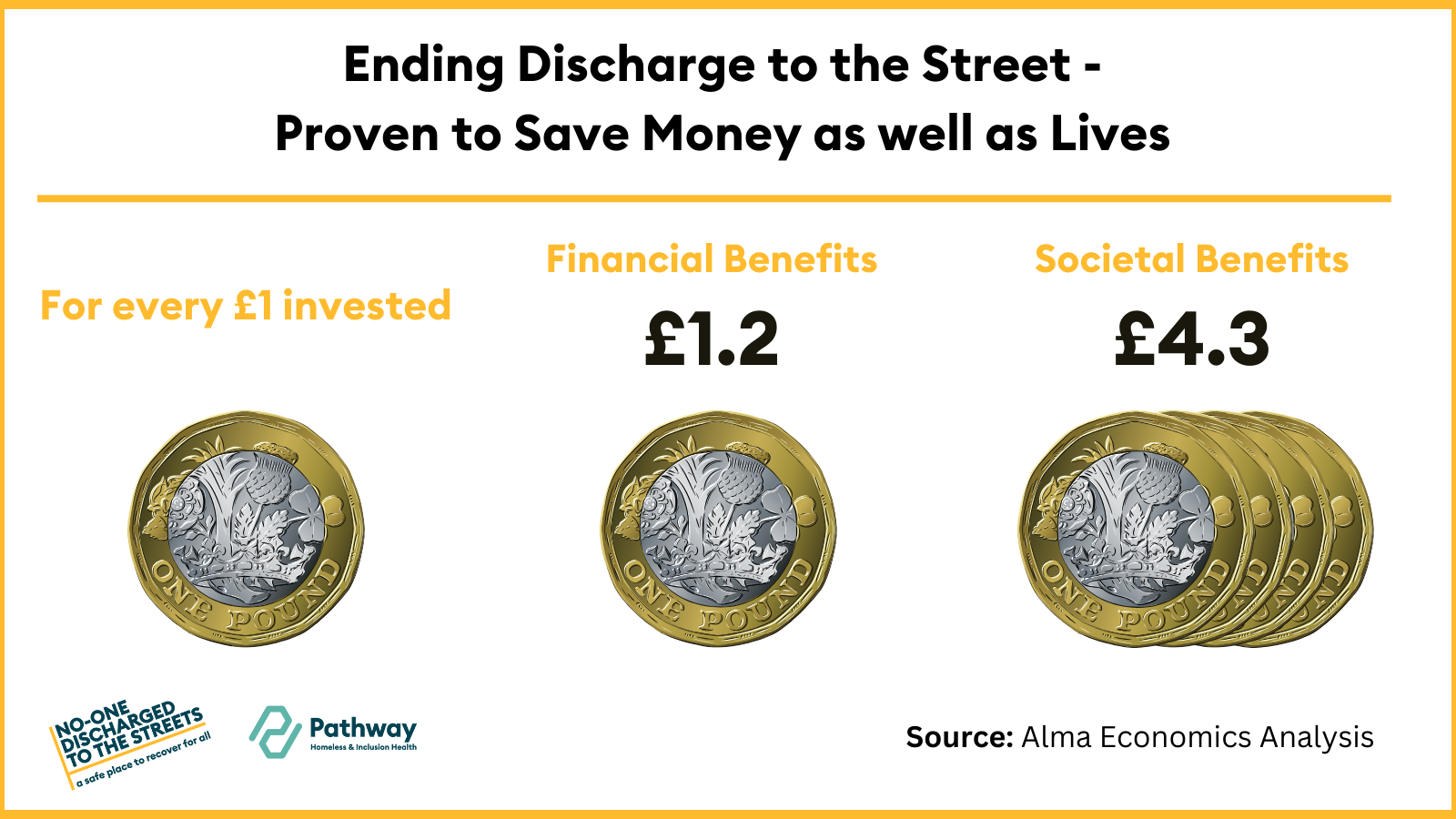
Being discharged from hospital onto the streets while recovering from a serious illness, or even surgery, is dangerous for patients, requiring them to attempt to manage issues such as wound care, new medication, and mobility problems in unsafe conditions. Inevitably, this leads to frequent readmissions to hospital, contributing to the ongoing severe pressures on the NHS. People facing homelessness are four times more likely to visit A&E as the general population, staying six times as long in hospital as in-patients.
A Freedom of Information Request to hospital trusts in England in early 2024 showed that at least 4,200 people were discharged from hospital to into homelessness from 2022-23.
To address this unacceptable situation, Pathway advocates for the scaling up of step-down services – a form of intermediate care. This solution, which has the backing of the National Institute of Clinical Excellence, provides safe, short-term accommodation and support to someone recovering from a hospital admission, whilst helping them to access services such as GPs, find long-term accommodation, all while supporting their healing and recovery, and helping to free up much-needed hospital beds by preventing avoidable readmissions.
The effectiveness of this kind of care is well-evidenced. A recent evaluation of intermediate care for people facing homelessness in one county in England found a 56% reduction in A&E visits and a 67% reduction in emergency admissions. This saved £47,000 of NHS funding per patient. However, there are too few of these services to meet growing demand, with an audit of 11,000 patients facing homelessness showed that an overwhelming 79% were discharged to somewhere that didn’t meet their needs, such as the street or unsuitable temporary accommodation.
In 2021, the Government launched the £16m Out of Hospital Care Model Programme, designed to provide more intermediate care for people facing homelessness on discharge from hospital. However, a new evaluation showed that while the funding helped to provide some new services, many closed down again as soon as central funding ended.
We know step-down intermediate care improves people’s quality of life and can end homelessness. However, not enough is being provided. My study of over 11,000 patients facing homelessness suggests 79% of them were discharged to somewhere unlikely help them to recover. This could be back to the street or to a hotel or other temporary accommodation with no support.
Professor Michelle Cornes, University of Salford and lead researcher of the recent evaluation
Specialist intermediate care for people experiencing homelessness is as cost-effective as it is good for people. Analysis commissioned by Pathway from Alma Economics shows that a proposed nationwide initiative to expand specialist intermediate care for people experiencing homelessness has an estimated financial benefit of £1.20 and societal benefit of £4.30 for every £1 spent. This is equal to financial savings of approximately £5,200 per patient.
You can find the full cost benefit report here and also watch a recent Channel 4 News report on the issues it raises here.

We want as many MPs as possible to understand for themselves the impossibility of maintaining good health whilst rough sleeping, and how ensuring an end to street discharges through the implementation of NICE recommended intermediate care must now be a priority for Government.
With a new 10-year NHS plan on the horizon and the Government committed to moving more care out of hospitals and into the community, we must take this opportunity to influence the system.
You can help us by signing our open letter to Prime Minister Keir Starmer; Angela Rayner, Deputy Prime Minister and Secretary of State for Housing, Communities and Local Government; and Wes Streeting, Secretary of State for Health and Social Care.
You can also help us by writing to your local MP and asking them to support Pathway’s campaign to end the dangerous practice of street discharge. As your local representative, your MP can raise your concerns in Parliament and write to Ministers to ask for action.
It only takes a few easy steps:
- Find your local MP on the Parliament website. This should also give you their contact details.
- Write your email. We have provided some suggested text below, but the more personalised your message, the better. You could include your own experiences or facts and statistics relevant to your local community, to explain why you care about this issue.
- Let us know! We would love to hear about who you have written to and what their response was. You can reach out to us at info@pathway.org.uk
Dear [MP’s Name], I’m writing as a constituent of [your constituency], to raise my concern about the continued practice of street discharge, where people experiencing homelessness are discharged from hospital to the street or other unsafe and inappropriate places. Not only is this an unacceptably dangerous and inhumane way to treat people who are recovering from illness, but it also places further pressure on the NHS by perpetuating the revolving door of hospital readmissions. This matter is particularly important to me because [include any personal experiences and key reasons here]. It doesn’t have to be this way. The evidence shows that specialist intermediate care, as recommended by National Institute of Clinical Excellence, provides a safe space for people facing homelessness to recover from illness, reducing rough sleeping and emergency hospital admissions. This service is as cost effective as it is beneficial for people. A cost-benefit analysis suggests that every £1 invested into a programme of specialist intermediate care for people experiencing homelessness, would return £1.20 in financial savings and generate £4.30 in societal value. This is equal to financial savings of approximately £5,200 per patient. I urge you to support Pathway’s call for an end to discharges to the street, and a guarantee to somewhere safe to recover by: 1. Submitting a Parliamentary Question that raises the issue of street discharge and asks Ministers to commit to ending it through the NHS 10 Year Plan and cross-Government homelessness strategy. 2. Writing to the Secretary of State for Health and the Secretary of State for Housing, Communities and Local Government to ask them to commit to putting in place the funding and reform needed to end street discharge in the NHS 10 Year Plan and cross-Government homelessness strategy. For more information visit: www.pathway.org.uk/issues/street-discharge/ or email: info@pathway.org.uk. Thank you for your attention to this urgent matter. Your engagement could be a crucial step towards ensuring no one is discharged to the streets. Kind regards, [Your Full Name] [Your Address]
